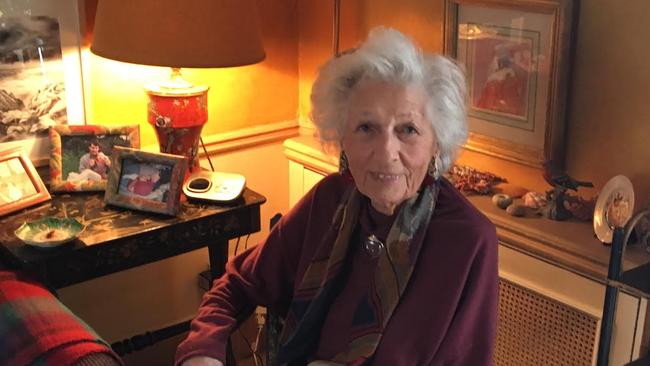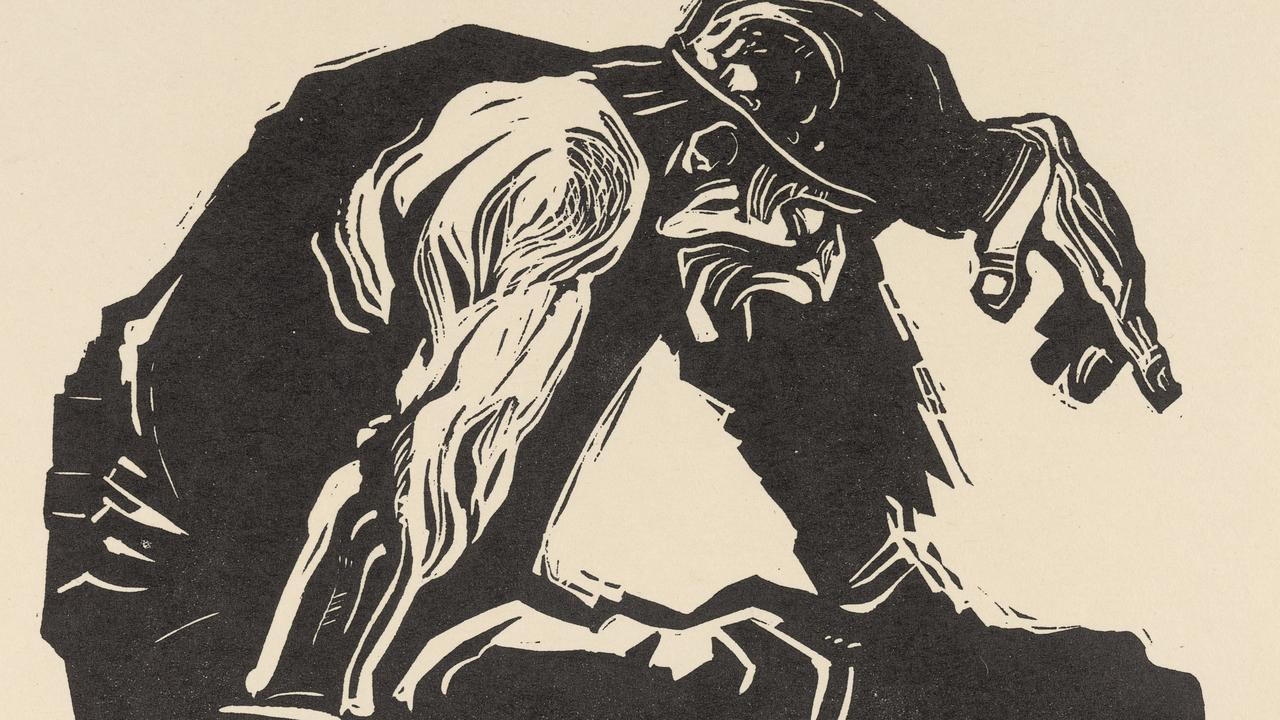Author, literary agent, filmmaker Robin Dalton has lived life to full
Author, literary agent and filmmaker Robin Dalton is a living advertisement for an engaged life.

Robin Dalton puts it down to genes. And optimism. And never saying no. She’s talking about being a 96-year-old, one who appears on this Saturday morning as buoyant as she must have when she arrived in London from Sydney more than 70 years ago. Dalton has had a big life by anyone’s standards but she wears it lightly, not keen to reflect or make too much of her capacity for survival.
As one interviewer wrote last year, Dalton is one of those “unsinkable women of the wartime generation whose accidental lives are a permanent surprise”.
“I try not to think about myself,” she says. “I’ve said in print that I never say no to experience and I think if you accept what’s on offer or whatever happens to you, then you learn a bit more about not turning your back on life.”
The journalist, author, intelligence agent, literary agent and film producer could never be accused of turning away from life. Her memoir, One Leg Over, is a slice of social history masquerading as a romp that tells us as much about 20th-century shifts in gender as any academic text.
From her youth in Sydney’s Kings Cross, through marriage, divorce, endless suitors, meeting the love of her life, his early death, her recovery and remarriage, Dalton races through the decades as if to slow down would be to invite a pointless review of the past.
She has no real regrets: “I mean I couldn’t have regrets because I’ve had a wonderful life … but I do regret not having done something a bit more serious and a bit more useful with my life … I never took anything through to its logical conclusion because there was always something else beckoning from behind it.” Her early years read like a prolonged holiday and “it’s only work I regret not having done, not play”.
Dalton is a great advertisement for an engaged life. “There’s practically nobody alive as old as me,” she says as she apologises for the state of her kitchen. She had people to dinner the night before and collapsed into bed before clearing up. And yes, she cooked the meal. Now she’s busy trying to work out her Skype connection for another scheduled interview but still manages to look chic and groomed by 10am.
Dalton has loved being a woman, and as a nonagenarian most misses being in love. Of feminism, she says: “I don’t know what it’s all about actually … I think women have a lovely time. They can do everything a man can do.” But she is sad that romance has been lost in the process.
Romance began early for Dalton, growing up in the bohemian Cross with a doctor father and a warm family she recorded in her 1965 memoir Aunts up the Cross. She cut a dash through the “tiny but intense” Sydney social world of the 1930s and 40s.
“It was ridiculous,” she says. “One was in the paper every day of one’s life and you couldn’t go outside the door without ‘Robin came to Prince’s [nightclub] last night’ and then describing one’s dress in detail … or ‘Robin Eakin [her maiden name] was on Bondi Beach surrounded by two swains’.”
It left her at 20 a “sitting duck” when her brief marriage went wrong and Sydney pored over the stories of her alleged indiscretions. It has made her reticent in interviews even now: “I suffered so dreadfully from dreadful publicity in my youth because my divorce was the biggest scandal ever to hit Sydney.” The October 26, 1941 spread in Truth was headed “Husband finds society wife’s love diary” alongside a picture of Dalton showing a good deal of leg as she danced the conga at the Trocadero.
“Glamorous as any movie queen, lovelier to look upon than most, there are few brighter stars in the glittering firmament,” the paper reported.
After the divorce and the war she landed in London, where people like her had their rations delivered by Fortnum & Mason in “a sturdy little cardboard box”. Even when the money stopped coming from Australia because of restrictions imposed after the war, Fortnum’s kept sending the egg and bacon rasher, saying: “Madame, we are delighted to provide for you until your difficulties have ended.” A grateful Dalton has shopped at Fortnum’s ever since.
If it sounds privileged, it’s because it was. But Dalton’s no snob and counts herself lucky to have landed on her feet in England “knowing practically nobody”. Still, her beau at the time was David Mountbatten, the marquess of Milford Haven, a cousin of Prince Philip and best man at his wedding.
Their relationship, begun in Australia, was never going to survive the fact Dalton was a divorcee — and one without much money to boot. But those were careless years, when the couple travelled to the Continent and she met some of the generation’s best and brightest — people such as John F. Kennedy, with whose gang she holidayed in France in 1948, at one stage helping him write postcards back home to potential voters.
“All London seemed gentle, and benign,” Dalton writes of that time. “There will never be another nightclub like the 400, with its soft dreamy music, its enveloping quiet intimacy … One friend swears that she married her husband because on their first evening there he managed to bone her kipper in the gloom.”
As she says: “It was frivolity after the war, pure frivolity.”
Her work in intelligence in the 50s came about through knowing Prince Chula of Thailand and appeared to consist largely of putting the Thai government in a good light. As a press attache in London, she wrote “earnest letters to The Times and the Guardian” and also managed the press for the first Southeast Asia Treaty Organisation conference in 1955. Still it’s a neat addition to the CV.
After the marquess, Dalton met a young Irish doctor named Emmet Dalton. She writes movingly of their marriage in 1953, the birth of their children and his premature death at 33, after just a few years together. By 1963, she was a literary agent to writers including Iris Murdoch, Edna O’Brien, Ruth Prawer Jhabvala, Margaret Drabble, Arthur Miller and Tennessee Williams, and the kitchen-sink playwrights John Osborne and Arnold Wesker, whose radical plays “broke the mould of West End plays”. She loved the nurturing element of being a literary agent, but the film-producing that followed (Oscar and Lucinda and Madame Sousatzka, among others) was also a buzz.
Her third husband, Bill Fairchild, a screenwriter and director with whom she shared 37 years, died in 2000, and in more recent times Dalton has returned to writing, having written her first illustrated novel, My Relations, at eight years old. It was published 86 years later, in 2015, by Text, which also republished Aunts up the Cross the same year.
Writing comes easily: “I never edit, I never reread and I seldom think!” Art is another passion and her flat is filled with pieces collected over a lifetime — Augustus John, Roger Fry. Pride of place is a painting by Abraham Mintchine, who died in Paris in 1931. With characteristic brio, Dalton explains: “When my father died, he didn’t leave a lot of money, but what money he did leave — I went to a cocktail party at a gallery on the night he died and I spent the lot on that painting.”
There was no Australian colony when she arrived in the 40s and her friends were English but she still thinks of herself as Australian.
Looking back, she says: “I am ashamed to say I’ve been contented all my life, even through real tragedy.” These days Dalton reckons she is just happy when she can get out of the bath without mishap. As she writes in her book, getting “one leg over” and on to the bathmat is a daily victory.
Other than that, being old is not a problem, and the future not really a consideration: “I haven’t got a future, I’m practically tottering off the edge …”
Helen Trinca is managing editor of The Australian and author of Madeleine: A Life of Madeleine St John.
Robin Dalton’s memoir One Leg Over will be reviewed next week.



